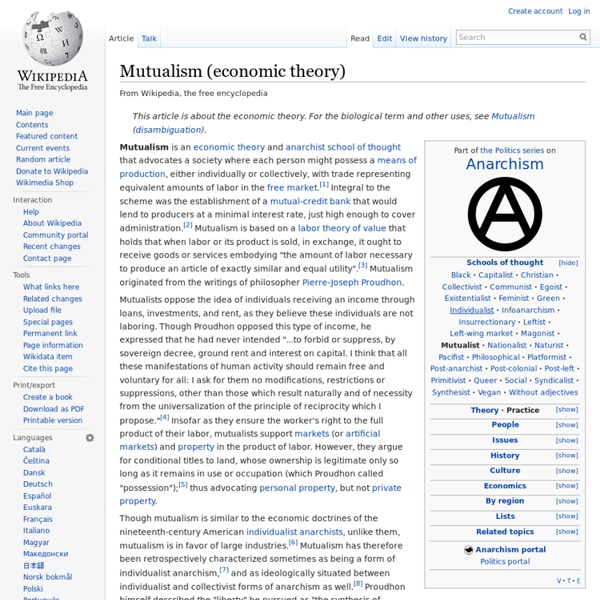Pierre-Joseph Proudhon (Woodcock biography)
From Wikipedia, the free encyclopedia 1956 biography by George Woodcock
MI Alliance of TimeBanks - How It Works
At its most basic level, TimeBanking is simply about spending an hour doing something for somebody in your community. That hour goes into the TimeBank as a Time Dollar. Then you have a Time dollar to spend on having someone doing something for you. It’s a simple idea, but it has powerful ripple effects in building community connections. Each TimeBank has a website where you list what you would like to do for other members. You look up TimeBank services online or call a community coordinator to do it for you. With TimeBanking, you will be working with a small group of committed individuals who are joined together for a common good.
Market anarchism
From Wikipedia, the free encyclopedia Branch of anarchism advocating free-market systems Samuel Edward Konkin III's agorism is a strand of left-wing market anarchism that has been associated with left-libertarianism.[5] Anarcho-capitalism has also been referred to synonymously as free-market anarchism.[6][7][8][9] Theory[edit] According to libertarian scholar Sheldon Richman, left-libertarians "favor worker solidarity vis-à-vis bosses, support poor people's squatting on government or abandoned property, and prefer that corporate privileges be repealed before the regulatory restrictions on how those privileges may be exercised", seeing Walmart as a "symbol of corporate favoritism" which is "supported by highway subsidies and eminent domain", viewing "the fictive personhood of the limited-liability corporation with suspicion" and "doubt[ing] that Third World sweatshops would be the "best alternative" in the absence of government manipulation". Roderick T. See also[edit] References[edit]
Bourgeois socialism
From Wikipedia, the free encyclopedia Political terminology and perspective Bourgeois socialism or conservative socialism was a term used by Karl Marx and Friedrich Engels in various pieces, including in The Communist Manifesto. Conservative socialism was used as a rebuke by Marx for certain strains of socialism but has also been used by proponents of such a system.[1] Bourgeois socialists are described as those that advocate for preserving the existing society while only attempting to eliminate perceived evils of the system.[2] Conservative socialism and right-wing socialism are also used as a descriptor, and in some cases as a pejorative, by free-market conservative and right-libertarian movements and politicians to describe more economically interventionist strands of conservatism, such as paternalistic conservatism. Perspectives and usage[edit] Proponents and practice[edit] Monarchical socialism[edit] War Socialism[edit] See also[edit] References[edit] Works cited[edit] External links[edit]
Category:Anti-capitalism
From Wikipedia, the free encyclopedia Articles relating to anti-capitalism, a political ideology and movement encompassing a variety of attitudes and ideas that oppose capitalism. In this sense, anti-capitalists are those who wish to replace capitalism with another type of economic system, usually some form of socialism or communism. Subcategories This category has the following 16 subcategories, out of 16 total. Pages in category "Anti-capitalism" The following 79 pages are in this category, out of 79 total.
Property is theft!
Political slogan coined by Pierre-Joseph Proudhon "Property is theft!" (French: La propriété, c'est le vol!) If I were asked to answer the following question: What is slavery? By "property", Proudhon referred to a concept regarding land property that originated in Roman law: the sovereign right of property, the right of the proprietor to do with his property as he pleases, "to use and [to] abuse", so long as in the end he submits to state-sanctioned title. He was denouncing the property of the man who uses it to exploit the labour of others without any effort of his own. Later, Proudhon argued that property is also liberty, a necessary "bulwark against the ever-encroaching power of the State", and "the only power that can act as a counterweight to the State". In the Confessions d'un révolutionnaire Proudhon further explained his use of this phrase:[4] In my first memorandum, in a frontal assault upon the established order, I said things like, Property is theft! What Is Property?
C4SS - The Center for a Stateless Society
Proudhon and His Children
From Wikipedia, the free encyclopedia Painting by Gustave Courbet Proudhon and His Children is an oil on canvas group portrait by Gustave Courbet, created in 1865, now held in the Petit Palais in Paris. The main figure is a posthumously produced image of French philosopher Pierre-Joseph Proudhon, who appears with his two children reading and playing. History[edit] Two other titles were given by Courbet to this painting, namely Proudhon and His Family and Pierre Joseph Proudhon and his children in 1853. Seized with other paintings by Courbet at Durand-Ruel in June 1873, it was sold on November 26, 1877, to Jean-Hubert Debrousse, who acquired it for 1,500 francs, when the asking price was 5,000 francs. Description[edit] The philosopher, dressed in a blouse and trousers in toile de Nîmes, is shown seated, posing with his left hand on his face and the right hand on his leg, with his two daughters, one who reads, while the other engage in playful activity, to his left. References[edit]
Pierre-Joseph Proudhon
Cercle Proudhon
Political party in France Cercle Proudhon (French pronunciation: [sɛʁklə pʁudɔ̃]; French for Proudhon Circle) was a national syndicalist political group in France. The group was inspired by Georges Sorel, Charles Maurras and a selective reading of anarchist theorist Pierre-Joseph Proudhon. History[edit] Founded on December 16, 1911, by national syndicalist disciples of Georges Sorel, Georges Valois and Édouard Berth, the group was described as "founded by nationalists, and initially addressed only to them".[2] The organisation began as informal meetings consisting of about twenty people on average, mainly monarchists and syndicalists who were associated with the right-wing monarchist group Action Française. The Circle published a bulletin entitled Cahiers du Cercle Proudhon, and operated a bookstore owned by Valois named the La Nouvelle Librairie which is still open to this day.[3] Ideology[edit] Democracy is the greatest error of the past century. Critique[edit] See also[edit]
Kevin Carson



